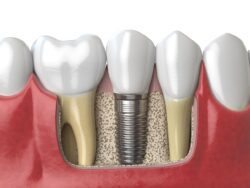Millions of people suffer from tooth loss which causes more struggles in their daily life. It creates oral dysfunction, dissatisfaction with the aesthetics of your smile, and higher risks of other dental problems, including within your jaw.
Don’t worry, there is a solution to this using a highly effective and comprehensive tooth replacement technique via dental implants. Unlike removable oral appliances, implants can help keep your jaw safe from complications that tooth loss can cause. Read on to discover how missing teeth can affect your jaw and how dental implants can prevent these issues.

How Does Tooth Loss Impact Your Jawbone?
A healthy person has a great smile, full set of teeth, and each tooth includes a root that extends below the gum line to reach the jaw. The tooth root stimulates the bone there and keeps it strong and stable.
When you lose one or more teeth, the jawbone no longer receives stimulation. In the absence of the tooth root, the bone begins to deteriorate. You can notice a sagging appearance in the face as well as a shifting of remaining teeth in the mouth.
You cannot stop these potential effects of tooth loss on your own. So you should seek tooth replacement through restorative solutions from your dentist like dental implants.
How Do Dental Implants Preserve Jawbone Health?
A dental implant is a type of tooth replacement that uses a titanium post anchor that a dentist surgically places into the jaw to ultimately support prosthetic teeth. This anchor serves as a substitute for the missing tooth root and provides stimulation to the jawbone once again.
This will keep the jawbone healthy, stopping the deterioration of the bone there. In some cases, it can encourage bone that was already lost to regenerate. With this treatment, you can preserve your facial and dental structure and avoid further oral health concerns related to tooth loss.
Removable dental solutions will replace teeth only above the gum line, so you will not see these extensive restorative dental advantages. With implants, you can protect your jaw as well as restore oral function and the appearance of your smile.
Can My Jaw Support a Dental Implant?
Implant dentistry offers many oral health benefits, but not every patient can qualify for this tooth replacement option. Implants rely on the fusion of the anchor with the jawbone to provide support for dental prosthetics.
So you must have enough healthy jawbone for this fusion to happen successfully. If too much bone in the jaw has already deteriorated in the wake of tooth loss, you cannot sustain an implant.
A dentist will evaluate your jawbone health to determine your eligibility for this treatment using x-ray imaging taken during a dental consultation. They will only proceed with this treatment if they determine you are a good candidate for a successful procedure.
If your jaw is too weak, they may suggest a bone graft to build stability. Once this heals, it may be strong enough to support an implant. If this is not feasible, you and your dentist can discuss alternative tooth replacement solutions.
